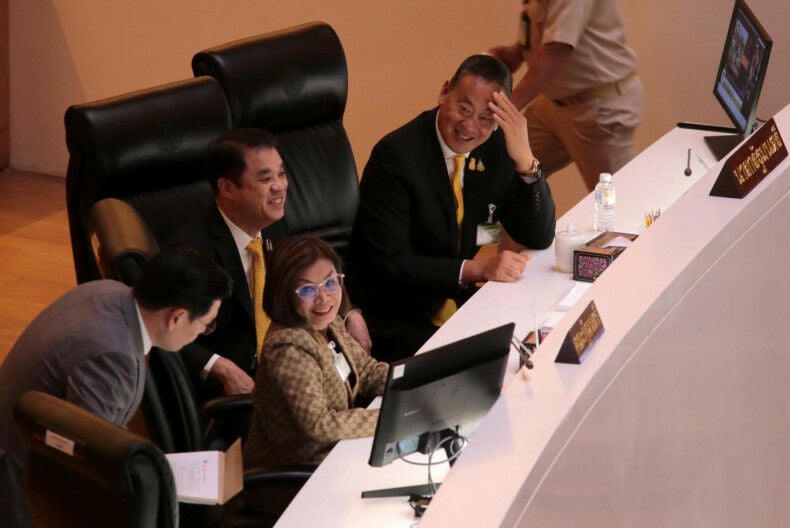Budget deficit: Government to unveil new economic measures

Amidst budget deficit concerns, the government will introduce new measures to boost the struggling economy next week, Prime Minister Srettha Thavisin announced today.
Discussions about economic stimuli and the stock market were held with Finance Minister Pichai Chunhavajira yesterday evening.
“A significant announcement on short-term, medium-term, and long-term measures will be made tomorrow or the day after.”
When asked if these measures would be beneficial, Srettha replied, “let’s wait and see.”
Pichai will also engage with Bank of Thailand (BoT) governor Sethaput Suthiwartnarueput to discuss the inflation target.
Addressing the government’s response to the BoT governor’s disagreement with adjusting the inflation target, Srettha mentioned that the discussions aim to resolve their differences.
The 62 year old prime minister noted that adjusting inflation targets is one of several strategies to stimulate the economy.
“It is Pichai’s responsibility.”
The government and the central bank have been at odds for months over interest rates, with Srettha advocating for a rate cut to energise the economy.
Earlier this month, the BoT maintained its key interest rate at 2.50%. The next rate review is scheduled for August 21. In May, when Pichai took office, he indicated he would re-evaluate the 1% to 3% inflation target with the central bank. The central bank has previously asserted that both interest rates and the inflation target are currently appropriate. May’s annual inflation rate stood at 1.54%.
The renewed discussions come amid political instability that has unsettled markets, as courts deliberate on several critical cases, including one demanding the prime minister’s removal for appointing the controversial politician Pichit Chuenban as a PM’s Office minister.
Fiscal 2025
Meanwhile, the opposition Democrat Party criticised the government’s budget bill for fiscal 2025 during a parliamentary debate yesterday.
Romtham Khamnurak, a Democrat MP for Phatthalung, argued that the budget plans to borrow to fund the government’s digital wallet handouts, thus increasing the nation’s debt.
The fiscal 2025 budget includes a deficit of approximately 865 billion baht, a rise of 24.9% from the 2024 allocation.
Romtham highlighted that the government would need to borrow to cover the deficit, nearing the legal borrowing limit.
Public debt stood at 11.3 trillion baht, or 62.5% of GDP, as of February, with expectations for this to rise to 70% in the coming months. The 2025 budget outlines regular expenditure of 2.7 trillion baht against an estimated revenue of 2.88 trillion baht.
“That’s why the government has to come up with the budget deficit and try to borrow.”
Romtham further criticised the planned use of the 805-billion-baht central fund, which should be reserved for emergencies only.
“The government now plans to spend 152.7 billion baht from the central fund to finance its digital-wallet scheme. It is trying to push the scheme through despite warnings about potential financial risks.”
On May 28, the Cabinet approved a budget bill worth 3.75 trillion baht for the 2025 fiscal year, which starts on October 1 and ends on September 30 next year. Around 152.7 billion baht was designated to support the government’s 500-billion-baht digital money handout.
The Cabinet also sanctioned a proposal to allocate 122 billion baht from the 2024 fiscal budget for the same purpose, reported Bangkok Post.
Parliament had yet to vote on the 2025 budget bill.
Latest Thailand News
Follow The Thaiger on Google News:


























